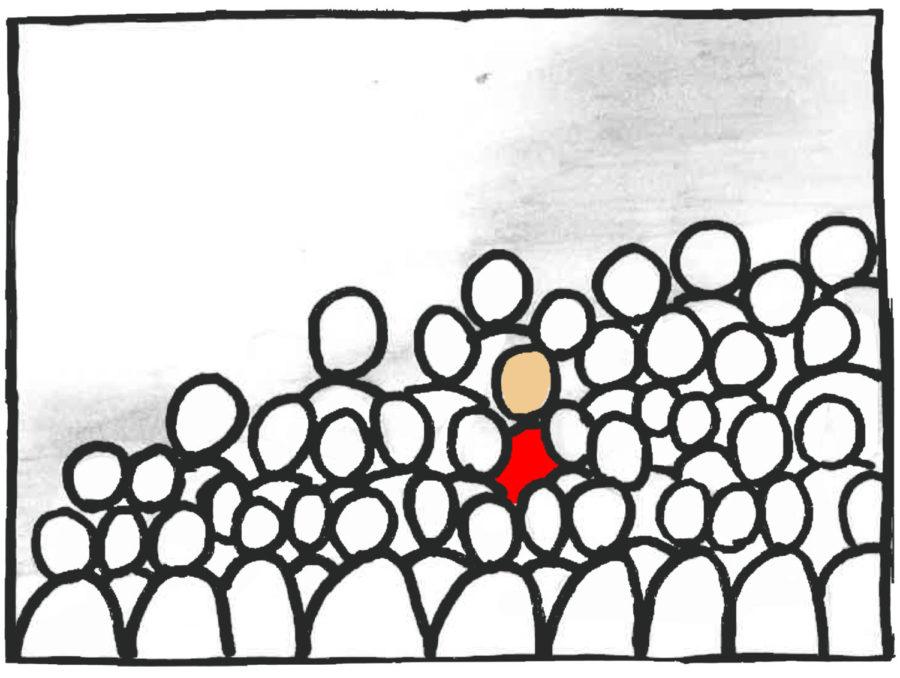Timberlake: (In)significance of humans
Graphic: Azwan Azhar/ Iowa State Daily
Being one of billions in the world and just a small portion of the universe, we can be deemed insignificant. But that insignificance may be what makes us significant.
December 13, 2013
Today, I’m going to talk about two things: how insignificant we are, and why that makes us significant.
You are a human being, one of 7 billion on this planet, of which all will be in the ground in the matter of a century. In the last 50,000 years, an estimated 100 billion people have walked this Earth, meaning roughly 7 percent of all people ever, are alive today. These numbers are defined by an arbitrary “start” of the Homo sapiens species, which could have evolved anywhere from 50,000 to 250,000 years ago, regardless, the small population numbers that far back are negligible.
Most scientists estimate that more than 99 percent of all species to live on Earth have become extinct, and if you want to define our species’ success by how long we’ve lived, we have a long ways to go — half a billion years in the case of the horseshoe crab.
Earth and the Solar System itself is 4.5 billion years old. That means Homo sapiens have existed on Earth for 1.1 to 5.5 percent of Earth’s existence depending on how old you define our species.
Earth was created by a dying star that collapsed and blew into a super nova billions of years ago scattering its elementary contents throughout the surrounding space — literally to the point in which each of your hands contains matter from two or more differing stars that are long since dead.
The universe began 13.8 billion years ago, according to NASA. Many of the stars we see in the night sky are vastly different than we see them and some don’t actually exist anymore but the light is still traveling to us from such distant places. The universe has seen the biggest and greatest come and go, and it doesn’t care. The universe is the most careless of all that which we know.
Humans aren’t even on the universe’s radar in size, nor time. We’re tiny creatures that live on a piece of rock hurling through the universe at 1.8 million miles per hour on our way towards another star system, collision inevitable. It’s obvious humans as a collective don’t make an impact on the universe and as far as I’m concerned, have no universal purpose except to exist as a byproduct of carbon-rich chemistry.
Humans are insignificant in the universe. We are immeasurably small. We have existed for no time at all. We do nothing for the universe.
Now I will ask you how this makes us significant.
In a matter of less than 66 years we went from not having the capability to fly to walking on the moon. If that’s not the most jaw dropping thing you’ve heard I don’t know what is. Think about that.
Your great-grandparents likely were born in an era where cars didn’t exist. We’ve also come to learn about our past so well that we can somewhat predict the future when it comes to climate and geology.
It is significant that we are insignificant because it shows that even without a role in the universe, life can flourish so much as to develop a brain that can self-intuit, and think about thinking. Having this ability gives us the power to affect our own destiny, so to speak. We’re no longer plagued by needing to hunt an animal or run from a leopard in order to perpetuate our existence.
We have the rare opportunity to control whether we succeed or not, with the universe as our purposeless playground. The documentary “Surviving Progress” quoted humans quite nicely: “If [we] go extinct on this planet our epitaph on our gravestone is going to be ‘why?’”
Knowing how insignificant we are in the universe gives us the breathing room to expand beyond what our dreams consist of. It is humbling and puts into perspective what we do and see while we are here on Earth.
If you imagine yourself standing on the moon looking back at Earth coming up over the horizon, realizing that all of history exists on that globe and you are so far away from it yet as close as can be, the significance of Earth and its inhabitants’ happenings become paltry.
Every moment of your day I want you to picture what you see, hear and experience as if you were sitting on the moon, and suddenly the clarity of its importance will be like washing mud off a gem.







